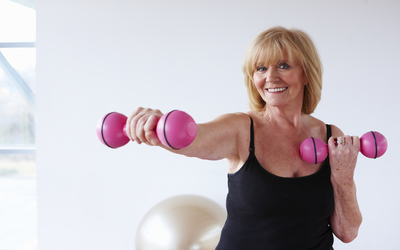There’s more than enough information on the market about how to lose weight, but when it comes to keeping that weight off it suddenly falls silent – so how do we maintain our new bodies once we’ve worked so hard to achieve them? Studies show that after the age of 40, a woman gains an average of a pound a year, which means by 60 you could be carrying an extra 20 pounds in weight. Such an increase in weight could also affect your health, increasing the risk of heart disease, stroke and diabetes. On first glance it seems an easy formula to solve – eat more than you expend and you’ll gain weight. However, hormones and lifestyle changes could also be to blame. Your diet may not be the only thing which needs to be monitored. The better you can understand the common changes to one’s weight, the better prepared you’ll be to combat those changes and keep the weight off – education is the best way to deal with it.
Weight gain with age is normal, as muscle tissue begins to slacken from the late 30s. Muscle burns around three times as many calories as fat, even when you’re resting, but as you age your muscles don’t work as efficiently as they used to. The result is that you’re not able to exercise as hard as you could when you were 20 and you have less muscle mass to burn off those extra calories. The trick? Resistance bands, weights and even your own body weight can be used to build up strength and improve your muscle mass. The more physical activity you do in general, as well as weight training, the better equipped your body will be to burn those calories off.
Your hormones play a big part in the bodily changes you experience as you age. As oestrogen is an appetite-regulating hormone, many women find that they experience more craving or the need to eat more after the menopause. As your hormones change, you may find that fat starts to migrate from the hips and thighs to the waist. Not only is this more difficult to shift, but it also increases your risk of heart disease and diabetes. Unfortunately there isn’t much you can do to prevent your hormones shape shifting. There’s also no proof from researchers that hormone-replacement therapy can help. However, a sensible diet and a solid exercise regime will help to keep you healthy. Reducing your stress can also help, so be sure to get plenty of sleep, rest and exercise to calm the mind.
There are many milestones which come with age that can lead to weight gain. Marriage, for example, often leads to people packing on the pounds, as does having children. Studies show that women in households with children eat more fat and calories than childless households – the equivalent could be as much as a slice of pepperoni pizza every day. The way to combat this is to weigh yourself more regularly – those who weigh themselves every day are, on average, between seven and eight pounds lighter than those who don’t. This is because tracking your weight gives you the opportunity to make changes before your weight gets out of hand. If you’re noticing that you’ve put on a few pounds, you can reel it in over the coming weeks and lead a healthier lifestyle to correct any weight gain before it becomes unmanageable. In any case, a healthy approach to your weight will help you to keep it in check so you can stave off any weight-related conditions.
